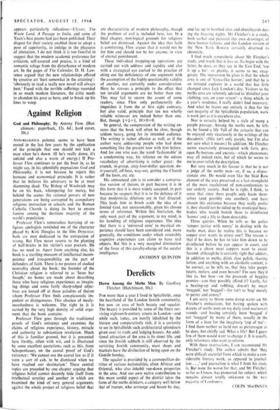Against Religion
God and Philosophy. By Antony Flew.. (Hut- chinson: paperback, 12s. 6d.; hard Over, 30s.) ANTI-RELIGIOUS polemic seems to have been muted in the last few years by 'the application of the principle that one should not kick a man when he's down. (If he's really down, it's unkind and also a waste of energy.) If Pro- fessor Flew continues to put the boot in, as he might say, in his splendidly pugnacious God and Philosophy, it is not because he rejects this humane and economical principle. It is rather that he believes his adversary to be at most shamming dead. The Bishop of Woolwich may be on his back, whimpering for mercy, but behind the scenes the rational powers of new generations are being corrupted by compulsory religious instruction in schools and the Roman Catholic Church is doing its best to ensure famine among the destitute majority of the world's population.
Professor Flew's remorseless harrying of re- ligious apologists reminded me of the character played by Kirk Douglas in the film Detective; both are men dedicated to the extirpation of wrong. But Flew never resorts to the planting of half-bricks in his victim's coat pockets. He has no need to. Apart from anything else, his book is a startling museum of intellectual incom- petence and irresponsibility on the part of defenders of faith. There is no posture of studied neutrality about the book; the founder of the Christian religion is referred to as 'Jesus bar Joseph,' no bones are made about describing those who have religious experiences as imagin- ing things and some fairly sharp-edged adjec- tives are loosed off at those paladins of theism whom Professor Flew finds conspicuously im- pudent or disingenuous. This absence of mealy- mouthedness is welcome. The right to it is earned by the very high density of solid argu- ment that the book contains.
Professor Flew goes through the traditional proofs of God's existence and examines the claims of religious experience, history, miracle and authority to substantiate revelation. Much- of this is familiar ground, but it is presented here freshly, often with wit, and is illustrated by some excellent quotations, such as this, from Schopenhauer, on the causal proof of God's existence: 'We .cannot use the causal law as if it were a sort of cab, to be dismissed when we have reached our destination.' These central topics are preceded by one chapter arguing that religious belief cannot decently hide itself from- intellectual scrutiny and another in which are - examined the kind of very general arguments against the whole project of religious belief that are characteristic of modern philosophy, though the problem of evil is included here, too. In a final chapter, non-logical grounds for religious belief are dismissed. Against the idea that faith is comforting, Flew argues that it would not be for him and should not be for anyone, in view of eternal punishment.
These individual mopping-up operations are carried out with address and rapidity and also with a strategical eye cocked to the practice of eking out the deficiencies of one algument with the assumption of the highly questionable validity of another, not currently under consideration. Here he stresses a principle to the effect that ten invalid arguments are no better than one. This may fail to secure the assent of some readers, since Flew only perfunctorily dis- tinguishes it from the at first sight contrary, but also valid, principle that ten not wholly reliable witnesses are indeed better than one. But, though 1-1-1=f, 10X0=0.
In general, the compression of the writing en- sures that the book will often be slow, though seldom heavy, going for its intended audience. The writing is rather allusive as well, as if the author were addressing people who had done something like the present tour with him before. And for one who uses the word 'fashionable' in a condemning way, his reliance on the odious vocabulary of advertising is rather great: the crunch, in-group, sixty-four-dollar question, do- it-yourself, off-beat, way-out, jetting the Church off the hook, etc. etc.
His announced aim is to consider a conserva- tive version of theism, in part because it is in this form that it is most widely accepted, in part because he suspects that it is to the defence of it that modernistic dilutions are in fact directed. This leads him to brush aside the idea of a limited God, not unreasonably, given his chosen terms of reference. Within this limitation, the only weak part of the argument, to my mind, is his handling of religious experience. The idea that there is a 'universal core' to mystical ex- perience should have been considered and, more generally, the conditions under which ostensibly cognitive experiences can claim to have real objects. But this is a very marginal diminution of the force of this cavalry-charge of the secular intelligence.
ANTHONY QUINTON






























 Previous page
Previous page